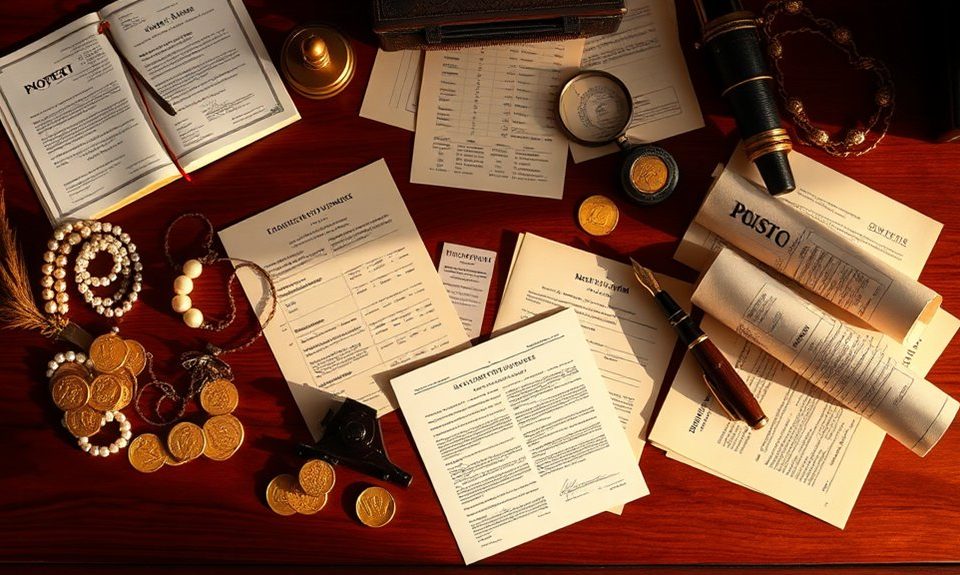In today’s competitive landscape, safeguarding your business’s unique assets is more important than ever. Intellectual property (IP) includes the creations and innovations that distinguish your business, ranging from trademarks to patents, as well as trade secrets and unique brand elements. This article explores the significance of IP, the potential repercussions of neglecting its protection, the different types of IP investigations, and the role of private investigators in enforcing these rights. It also discusses the methods employed in these investigations, including evidence collection and surveillance techniques, and provides practical steps to protect your assets from theft. By understanding these elements, you can maintain a competitive edge, secure the future of your business, and ensure compliance with intellectual property law.
Key Takeaways:
The Importance of Safeguarding Your Business’s Unique Assets
Protecting a business’s unique assets, including intellectual property, trademarks, copyrights, and trade secrets, is essential for enhancing competitiveness in today’s market. As corporate security evolves, businesses must take proactive measures to safeguard their ideas and brand from unauthorized use and abuse, while also ensuring compliance with intellectual property laws, non-disclosure agreements, and other regulations.
By prioritizing risk management strategies, including strategic asset safeguarding and securing essential business assets, companies can strengthen their market position, build consumer trust, and reduce the impact of cybercrime and data breaches.
Defining Intellectual Property
Intellectual property (IP) encompasses a range of legal rights associated with creative works, including trademarks, copyrights, and patents, and requires robust legal protection to safeguard the interests of both creators and businesses.
For entrepreneurs, a solid understanding of intellectual property is essential for safeguarding their unique brands and innovative ideas from competitors and unauthorized use, and for ensuring the longevity of their business strategy.
Trademarks protect logos and brand names, while copyrights grant ownership over artistic and literary works, preventing unauthorized reproduction and potential misuse. Patents provide inventors with exclusive rights to their inventions, enabling them to profit from their innovations without the risk of duplication.
These protections are vital, as they not only foster creativity and innovation but also ensure that inventors and artists can benefit financially from their work through licensing creations and exclusive rights.
By clarifying ownership, intellectual property rights cultivate an environment where creativity can thrive, ultimately benefiting society by introducing new ideas and products, while helping businesses maintain their competitive edge.
Why Intellectual Property is Valuable
Intellectual property is essential for enhancing a business’s market position and building consumer trust, making it a crucial element of a competitive strategy in today’s rapidly changing marketplace, while also mitigating cybersecurity risks.
Effectively managing and protecting intellectual property can prevent the financial losses associated with IP infringement, security breaches, and insider threats, while simultaneously creating opportunities for generating new value.
For instance, although Apple and Samsung are fierce competitors in the mobile device market, both companies have leveraged their robust IP strategies to patent innovations that strengthen their market positions and create significant revenue streams through licensing agreements.
By proactively utilizing intellectual property in this way, companies can differentiate their offerings, foster brand loyalty, and establish a competitive advantage that is challenging for rivals to overcome, keeping their intellectual assets secure.
A strong IP portfolio not only attracts investors but also enhances a company’s overall valuation.
The Consequences of Not Protecting Intellectual Property
Failing to protect intellectual property (IP) carries significant risks, including lawsuits, financial losses, and loss of revenue due to IP violations and misuse. Companies that do not adequately safeguard their trademarks, copyrights, and patents expose themselves to the risk of improper use of their valuable intellectual property, which can adversely affect their market position, brand reputation, and result in unauthorized use of their creations.
A notable example is the case of the well-known toy manufacturer Mattel, whose insufficient protection of its intellectual property led to substantial financial losses from counterfeiting, potential misuse, and a damaged brand image. Similarly, tech giant Apple has encountered numerous IP challenges, including a high-profile lawsuit against Samsung regarding patent infringements.
These instances highlight the severe consequences of neglecting to protect IP assets. The experiences of both Mattel and Apple illustrate that inadequate protection of intellectual property can enable competitors to exploit innovations, resulting in significant financial setbacks and diminished market presence.
Types of Intellectual Property Investigations
Businesses must be aware of the various types of intellectual property investigations to effectively protect their proprietary assets, including their digital security and confidential information, and maintain their competitive advantage.
Private investigators conduct investigations that encompass a wide range of IP topics, including trademark, copyright, patent investigations, and corporate investigations to uncover potential threats.
Each type of investigation necessitates a unique approach to evidence gathering in order to effectively address potential threats.
Trademark Infringement
Trademark infringement occurs when a trademark that is identical or confusingly similar to a registered trademark owned by another entity is used without authorization. This infringement can result in legal disputes and the loss of brand identity.
Protecting trademarks is essential for businesses, as it helps maintain their brand identity, safeguards their intellectual property, and ensures legal protection against unauthorized use. Trademark infringement can take many forms, including the improper use of a company’s logo, slogan, or brand name in a way that may mislead consumers about the origin of goods or services.
Legal definitions of trademark infringement vary significantly, but they often focus on the likelihood of confusion, which can greatly affect a company’s market position. A notable example of the seriousness with which these matters are addressed in court is the high-profile legal battle between Apple and Samsung over smartphone designs.
The consequences for trademark infringers can include financial damages, injunctions to cease the infringing behavior, and legal action, highlighting the importance of trademark monitoring and legal protection for businesses. In today’s increasingly competitive environment, protecting trademarks is vital for maintaining the integrity of a brand and building consumer trust.
Copyright Violations
Copyright violations refer to unauthorized uses, reproductions, or distributions of copyrighted material, often detected through surveillance equipment and digital forensics. These violations can lead to significant negative consequences for both individuals and businesses, including legal action and financial penalties.
Copyright law is designed to protect creative works by ensuring that creators can maintain exclusive rights, monetize their intellectual property, and take legal action against infringers. Violating copyright can result in financial penalties and legal repercussions, such as cease-and-desist orders or lawsuits aimed at recovering damages.
These legal consequences serve as essential tools for enforcing copyright protections and preventing infringement. The primary purpose of copyright law is to encourage creative work by assuring authors, artists, and other creators that their work will not be shared without their permission.
This legal framework fosters an environment conducive to creativity, enabling original works to generate returns on investment while safeguarding creators’ rights against misuse and unauthorized distribution.
Patent Infringement
Patent infringement refers to the unauthorized use of an invention that is protected by a patent, posing serious legal and financial challenges. Such infringement can lead to litigation and significant financial losses. It poses a serious challenge for businesses involved in research and development, as they may require legal guidance to protect their patents and innovative technologies.
Patent infringement can occur in several ways:
- Direct infringement is the most straightforward form, where the infringer uses the patented invention precisely as it was patented.
- Indirect infringement encompasses contributory infringement, where the infringer supplies a component they know will be used to violate the patent. It can also involve inducement, where the infringer actively assists another party in infringing upon a patent.
Legal remedies for patent infringement include injunctive relief and monetary damages, such as lost profits and, if appropriate, reasonable royalties from the infringing party. A well-known example of patent infringement is the lengthy legal battle between Apple and Samsung over smartphone design patents. This case underscored the intense competition in the technology sector and the lengths to which companies will go to protect their intellectual property.
Given the complexities of patent law, it is often necessary for individuals and businesses to seek advice from attorneys who specialize in this field to prevent potential infringement, enforce their rights, and manage compliance measures.
How Intellectual Property Investigations are Conducted
Intellectual property investigations encompass a systematic process of gathering evidence, identifying suspects who may be involved in potential IP violations, and employing surveillance techniques to ensure evidence admissibility.
Private investigators play a crucial role in this process, often collaborating with lawyers to ensure that the findings can effectively support any litigation against infringers. By incorporating surveillance techniques and understanding intellectual property law, they help safeguard innovative concepts and protect business assets.
Gathering Evidence and Identifying Suspects
Gathering evidence and identifying suspects is a critical component of intellectual property investigations, as it enables private investigators to ascertain the facts related to potential violations. This process often involves understanding the nuances of intellectual property law and identifying any unauthorized use or potential misuse of creative works.
These methods often encompass corporate investigations and surveillance techniques to ensure comprehensive evidence collection. Investigations may involve digital forensics, where investigators examine electronic devices and online activities to identify parties who are infringing on trademarks, copyrights, or trade secrets.
Undercover operations may also be conducted, with operatives posing as potential customers or clients to uncover illicit practices. Additionally, interviews with whistleblowers or industry insiders can provide valuable insights into potential data breaches and insider threats.
Data analytics tools are employed to detect patterns and anomalies that suggest copyright violations, trademark infringements, or patent protection breaches. By utilizing a diverse range of strategies, private investigators can not only gather compelling evidence but also successfully identify suspects and protect a business’s intellectual assets.
Working with Legal Professionals
Private investigators conducting intellectual property investigations must collaborate with legal professionals. This partnership ensures that the evidence collected is sufficient for pursuing legal action and is admissible in court.
The role of legal professionals is crucial, as they provide a framework for interpreting and applying IP laws, as well as determining the next steps based on the findings. Their involvement broadens the scope of the investigation, allowing private investigators to focus on gathering intelligence.
Together with their legal counterparts, they can thoroughly explore the case while remaining compliant with various legal requirements. The participation of legal professionals helps navigate the complexities of copyright, trademark, and patent laws, ensuring that the evidence gathered is both relevant and legally adequate.
Ultimately, the goal of these investigations is to build a legally defensible case that will hold up in court, highlighting the importance of both roles in the ever-evolving landscape of intellectual property rights.
Preventing Intellectual Property Theft
Preventing intellectual property theft requires a comprehensive approach that incorporates protective measures, robust business strategies, and a strong focus on corporate security and cybercrime deterrence.
Businesses should implement proactive risk management procedures, such as non-disclosure agreements and strategic asset safeguarding, and take steps to mitigate cybersecurity risks in order to protect their valuable intellectual property from theft or unauthorized use. This includes safeguarding confidential information and digital security from potential cybercriminals.
Steps to Safeguard Your Business’s Assets
To protect a business’s assets in the context of safeguarding intellectual property and ensuring long-term success, several specific steps should be taken. These include improving corporate security with surveillance equipment, implementing risk management practices, and regularly reviewing the legal protections for the business’s intangible assets, such as trademarks, copyrights, patents, and trade secrets. Employing legal guidance and evidence collection methods ensures continued compliance with intellectual property laws.
- Enhance Corporate Security: The first step involves conducting security audits to assess current practices and systems, identifying potential vulnerabilities. Additionally, businesses can improve security by implementing advanced surveillance technology and providing employee training on the importance of security and their roles in maintaining it.
- Risk Management: Organizations should establish comprehensive risk management frameworks that include regular evaluations of potential threats from both internal and external sources. It is also important to create detailed response plans to address various threat scenarios, thereby mitigating the potential damage to the firm’s operations and profitability.
- Create a Culture of Asset Protection Awareness: Engaging employees in the asset protection process ensures that they understand their responsibilities in safeguarding the company’s resources. This includes managing employee access and complying with guidelines to prevent security breaches and maintain consumer trust. By implementing these strategies, businesses can minimize their exposure to risks and enhance the security of their assets, preserving their market position and competitive edge.
Importance of Regular Audits and Monitoring
Regular audits and monitoring are essential for maintaining the integrity of intellectual property and ensuring compliance with relevant laws and regulations. Routine audits enable businesses to identify security breaches and implement compliance measures to safeguard their intellectual property and other assets.
These measures help pinpoint vulnerabilities that could lead to unauthorized use or theft of intellectual property, demonstrating a company’s commitment to protecting its innovations.
Organizations can leverage regular audits to refine their security measures and ensure adherence to ever-evolving regulations and legal standards. Furthermore, regular monitoring provides a valuable feedback loop that allows businesses to adapt their intellectual property strategies in response to changing market conditions and technological advancements.
These audits are crucial for establishing a robust defense against potential IP infringements and contribute to comprehensive risk management. They help ensure evidence admissibility in legal actions and protect against financial losses by highlighting areas of non-compliance that could be exploited by cybercriminals.
Frequently Asked Questions
What is the importance of conducting intellectual property investigations for businesses?
Intellectual property, such as trademarks, patents, and trade secrets, are crucial assets for businesses. Conducting investigations helps to safeguard these assets and prevent any unauthorized use or infringement.
How can intellectual property investigations protect my business’s unique assets?
By conducting investigations, you can identify any potential threats to your intellectual property and take action to prevent them from being misused or stolen. This protects your business’s unique assets and gives you the ability to take legal action if necessary.
What kinds of intellectual property should be included in an investigation?
Any type of intellectual property that is essential to your business, such as trademarks, patents, copyrights, and trade secrets, should be included in an investigation. Involving innovative technology and creative works ensures comprehensive protection for all of your unique brand and intellectual assets.
How do I know if my business’s intellectual property has been infringed upon?
Signs of infringement may include unauthorized use of your business’s name or logo, similar products or services being offered by another company, or unauthorized use of your proprietary information. It’s important to regularly monitor and investigate any suspicious activity to protect your assets.
What are the potential consequences of not conducting regular intellectual property investigations?
Failure to conduct regular investigations can leave your business vulnerable to intellectual property theft, which can lead to financial losses and damage to your reputation. It can also make it more difficult to take legal action against infringers.
How can I ensure that my business’s intellectual property investigations are conducted effectively and efficiently?
It’s important to work with reputable and experienced private investigators and legal professionals who specialize in intellectual property investigations. They will have the necessary expertise, resources, and techniques to conduct thorough and efficient investigations to safeguard your business’s unique assets, including licensing creations and protecting innovative ideas.






